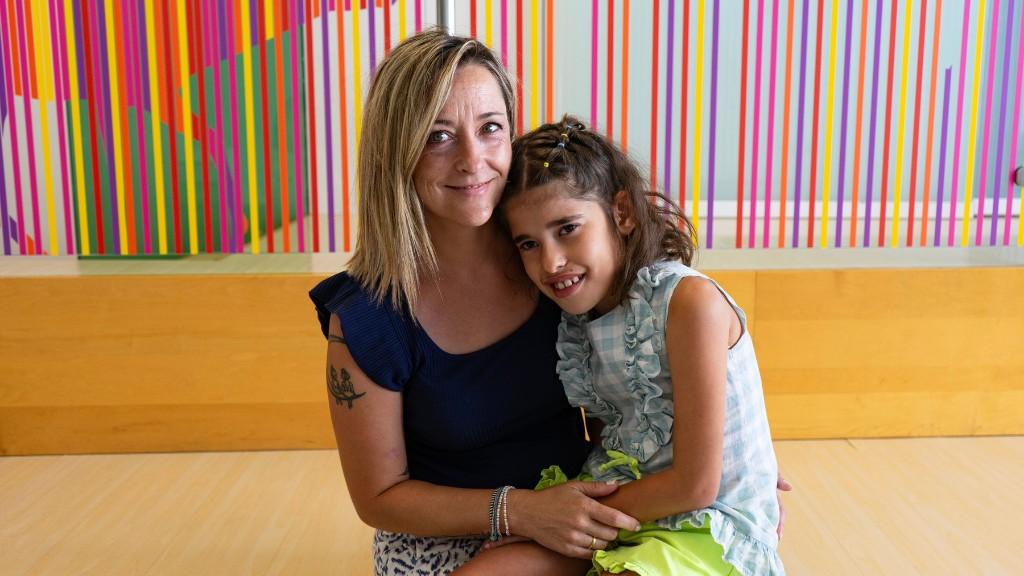“We really appreciated our doctor giving us some pointers about the research that is being carried in the world on our daughter’s illness”

The mother of a girl with Pitt-Hopkins syndrome says that her behavioural disorders, rather than her learning disability are her main limitation.
Mara was a much desired daughter. Her mother, Begoña had to resort to assisted reproduction techniques because she had endometriosis. She managed to get pregnant 11 years ago and after an uneventful pregnancy she gave birth to her eldest child, Mara.
She began to suspect that not everything was right a few months later. Begoña recalls that other couples who were friends had had children at around the same time. She quickly realised that her daughter did not do many of the things that the children of her friends were able to do at the same age. “She didn’t pick things up, she didn’t connect with us, she didn’t turn around or sit up. We then told the paediatrician about this and she told us not to worry, that our girl was a little lazy and that she had a different rhythm”.
The little girl’s admission to hospital due to gastroenteritis gave them the opportunity to discuss their concerns with the doctors at Zaragoza’s teaching hospital and ask them for a second opinion. That was when Mara and her family started their long journey of medical appointments and doctors’ visits.
She was just one year old. After many tests, by the time she was eventually diagnosed with Pitt-Hopkins syndrome she was four. This is a rare disease that causes learning disabilities, digestive disorders, epilepsy and behavioural disorders, amongst others.
“This may seem strange, but her learning disability is what concerns us the least. What really makes her and us suffer are her behavioural disorders due to the illness. When she has a fit, she harms herself and hits us, so she has to be restrained. This not only has a huge impact on our daily lives, but makes us go through difficult situations because people don’t know about it and jump to the wrong conclusions”, explained Begoña.
It was in fact one of these outbursts that led her mother who was by now in utter desperation to ask for help from the hospital in Zaragoza that had originally taken care of her, from where she was referred to SJD Barcelona Children's Hospital, a leader in rare diseases in children. Since 2023, she has been looked after by Dr Merche Serrano, a neurologist who is an expert in this disease, as well as by other specialists in endocrinology and dentistry.
“We feel very lucky because thanks to the doctors who look after us in Zaragoza, especially Dr José Luis Peña, and those at SJD Barcelona Children's Hospital, and Dr Merche Serrano in particular, we feel very much cared for. If we have any problems or concerns, we call them or send an email and we always get an answer. We have found out from other families that this is not always the case”, Begoña pointed out
. She also appreciated that “they do not just limit themselves to asking us questions, but they also try to explore how they can improve our children’s outcomes as they want to find out more about the disease. It is encouraging to see that they do not give up, that they are keen to change things and act on their findings. I have come across doctors who just say that they don’t know what to do, and as a parent that is very hard”.
Begoña very much appreciates the care and advice from the team at SJD Barcelona Children's Hospital on matters related to research. “We find it very important and very much welcome that our main doctor at SJD Barcelona Children's Hospital, who is an expert in rare diseases, informs us, explains and fills us in on the research that is been carried out across the world on our daughter’s illness. This allows us to thoroughly weigh up our options, decide whether something is a good opportunity for our daughter and to temper our expectations.
As a matter of fact, at SJD Barcelona Children's Hospital various healthcare professionals have met a group of families twice from the Pitt-Hopkins Association in Spain to explain to them which trials are currently being conducted on this rare disease or that it has been anticipated will be started in the coming months. One of them, led by the researcher at SJD Barcelona Children's Hospital, Judith Armstrong, seeks to discover the similarities between Pitt-Hopkins syndrome and Rett syndrome.
Begoña, who sits on the board of trustees of the Pitt-Hopkins Association in Spain, does not want to finish her testimonial without sending a message of hope to other families affected: “Although our path is not at all rosy, and we live with the feeling of having to constantly be on the alert, we must not forget to live our lives. We have to find those moments that invigorate us and enjoy them”.




